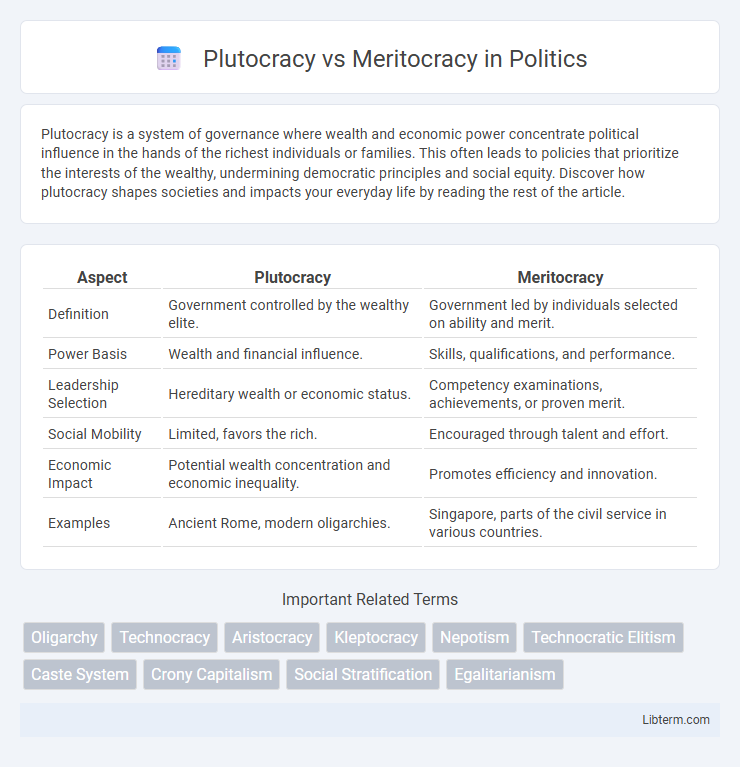Plutocracy is a system of governance where wealth and economic power concentrate political influence in the hands of the richest individuals or families. This often leads to policies that prioritize the interests of the wealthy, undermining democratic principles and social equity. Discover how plutocracy shapes societies and impacts your everyday life by reading the rest of the article.
Table of Comparison
| Aspect | Plutocracy | Meritocracy |
|---|---|---|
| Definition | Government controlled by the wealthy elite. | Government led by individuals selected on ability and merit. |
| Power Basis | Wealth and financial influence. | Skills, qualifications, and performance. |
| Leadership Selection | Hereditary wealth or economic status. | Competency examinations, achievements, or proven merit. |
| Social Mobility | Limited, favors the rich. | Encouraged through talent and effort. |
| Economic Impact | Potential wealth concentration and economic inequality. | Promotes efficiency and innovation. |
| Examples | Ancient Rome, modern oligarchies. | Singapore, parts of the civil service in various countries. |
Defining Plutocracy and Meritocracy
Plutocracy is a system of governance where wealth determines power, concentrating authority in the hands of the richest individuals or families. Meritocracy, by contrast, allocates power and opportunities based on individual talent, effort, and achievements rather than inherited status or wealth. These contrasting frameworks shape social hierarchy and influence economic inequality within societies.
Historical Origins of Plutocracy and Meritocracy
Plutocracy, rooted in ancient societies such as Classical Athens and the Roman Republic, emerged as wealth concentrated political power among elite classes, reinforcing economic dominance through hereditary privilege and land ownership. Meritocracy, a concept popularized in 20th-century China and Western democracies, originated from Confucian principles and evolved through bureaucratic reforms emphasizing talent, education, and ability as criteria for political and social advancement. The historical divergence between these systems highlights how plutocracy institutionalizes wealth-based governance, while meritocracy institutionalizes skill-based governance.
Core Principles and Values
Plutocracy is a system of governance where power is concentrated in the hands of the wealthy elite, prioritizing wealth accumulation and economic influence as the basis for authority. Meritocracy emphasizes the distribution of power and opportunities based on individual talent, skills, and achievements, valuing competence and effort over socioeconomic status. Core principles of plutocracy include wealth dominance and inherited privilege, whereas meritocracy stresses fairness, equal opportunity, and the reward of merit in leadership and societal advancement.
Economic Impacts of Each System
Plutocracy concentrates wealth in the hands of a few, often leading to economic inequality, limited social mobility, and reduced innovation due to lack of competition. Meritocracy promotes efficiency and economic growth by rewarding talent and effort, facilitating upward mobility and encouraging a skilled workforce. However, meritocracy can sometimes overlook structural inequalities that hinder equal access to opportunities, potentially perpetuating economic disparities.
Political Structures and Power Dynamics
Plutocracy centralizes power within the wealthiest elites, where economic capital directly influences political decisions and policy-making, often marginalizing broader public participation. Meritocracy distributes political authority based on individual talent, achievement, and qualifications, theoretically promoting efficiency and competency in governance. Power dynamics in plutocracies tend to favor entrenched financial interests, whereas meritocracies strive to balance authority through demonstrated skill and meritocratic selection processes.
Social Mobility: Myths and Realities
Social mobility in plutocracies often remains limited as wealth concentration enables elite families to maintain power across generations, perpetuating economic inequality. Meritocracies theoretically promote social mobility by rewarding talent and effort, but real-world barriers such as unequal access to quality education and social networks challenge this ideal. Studies reveal that social mobility rates are higher in societies with balanced policies addressing both economic disparities and educational opportunities.
Education’s Role in Both Systems
Education in a plutocracy often reinforces existing wealth disparities by providing elite access to exclusive institutions and networks that sustain financial power. In contrast, meritocracy emphasizes equal educational opportunities that reward individual talent and effort, promoting social mobility based on achievement rather than inherited status. The quality, accessibility, and inclusivity of education largely determine how effectively either system cultivates or limits leadership and influence.
Case Studies: Real-World Examples
Plutocracy, characterized by wealth-based power, is exemplified by historical cases like the Gilded Age in the United States, where industrial magnates controlled political influence. Meritocracy finds real-world applications in countries like Singapore, where policies emphasize education and performance for career advancement, minimizing wealth-based disparities. These case studies illustrate how governance systems shape societal structures and resource distribution through wealth or merit.
Challenges and Criticisms
Plutocracy faces criticism for concentrating power in the hands of the wealthy, leading to social inequality and reduced political representation for lower-income groups. Meritocracy struggles with biases in assessing merit, often overlooking systemic barriers that inhibit equal opportunities for marginalized communities. Both systems are challenged by questions of fairness and the potential entrenchment of privilege rather than true equity and competence.
The Future: Striking a Balance
The future demands a nuanced approach that balances the wealth concentration of plutocracy with the talent-driven advancement of meritocracy. Integrating transparent governance frameworks can mitigate the risks of inequality inherent in plutocratic systems while preserving meritocratic incentives for innovation and social mobility. Emerging technologies and data analytics will play a crucial role in shaping policies that promote both economic equity and merit-based opportunities.
Plutocracy Infographic

 libterm.com
libterm.com